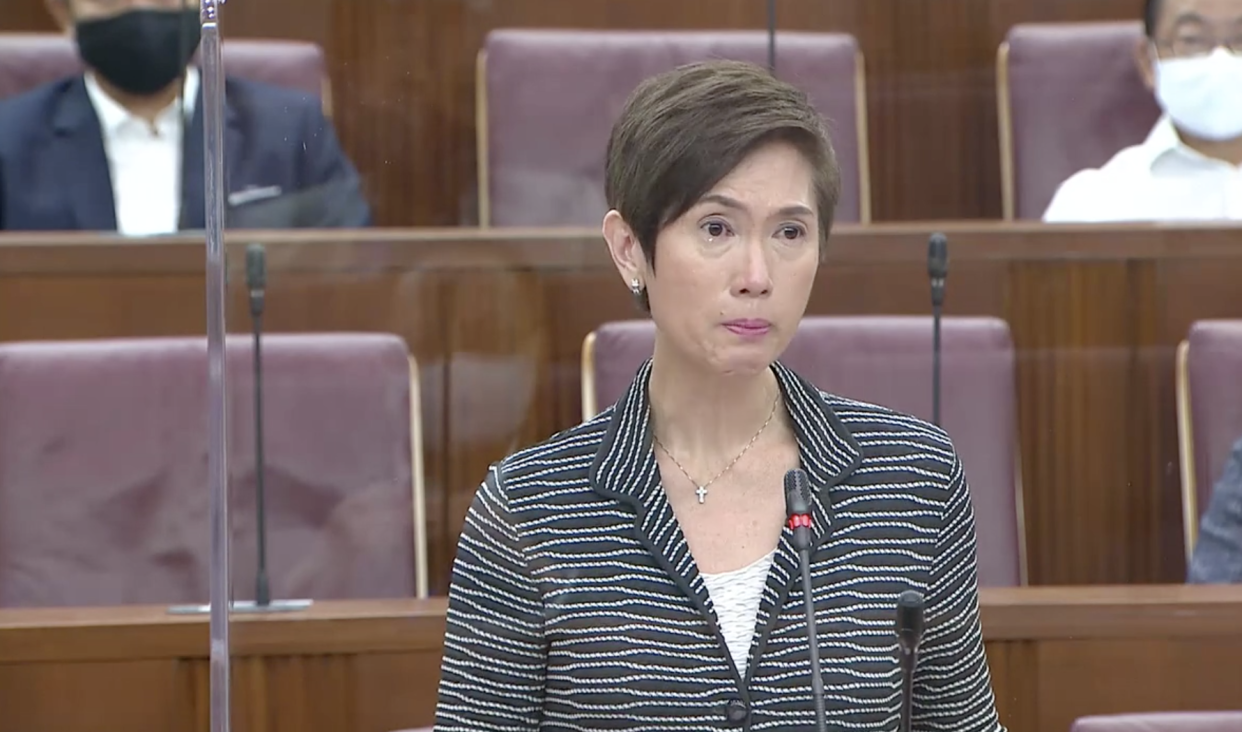Tearful Josephine Teo says government stands by workers amid COVID-19-led downturn

SINGAPORE — Manpower Minister Josephine Teo was visibly emotional during her speech in Parliament on Tuesday (1 September) when she stressed that the government would maintain its steadfast support for workers in Singapore amid the economic downturn caused by the COVID-19 pandemic.
“Please know that you too are always in our hearts. However long this storm lasts, the MOM (Ministry of Manpower) will walk the journey together with you. However tough it may be, we will help you bounce back," she said.
The ministry’s mission “is to help each one of you emerge stronger by never giving up hope and by working with employers in Singapore to treat you fairly, to make your hard work bear fruit”, Teo added.
“Our work is not yet done. We have taken firm steps forward and we will press on whatever the challenges – with you, for you, for Singapore.”
During her speech in Parliament, Teo spoke at length about the government’s push to retain the Singaporean core in the local workforce.
These include adjusting work pass policies regularly and slowing down the growth of Employment Pass (EP) and S Pass holders considerably, she said.
For instance, she pointed out, in the past five years from 2014 to 2019, the number of EP and S Pass holders has grown less than 9,000 annually on average, less than one-third of the average annual growth of 30,400 in the previous five-year period.
At the same time, the number of locals – Singaporeans and permanent residents – in PMET (professional, manager, executive, and technician) jobs has grown by around 35,000 annually from 2014 to 2019, Teo said.
“In other words, for every new EP or S Pass holder added in the last five years, about four more locals took up PMET jobs,” she added, noting that the population of permanent residents has remained stable, at about 0.5 million, throughout the same period.
With COVID-19, the number of EP and S Pass holders have come down sharply – between January and July this year, it dropped by 22,000.
The MOM, as mentioned in last week’s announcement of the tightening of EP and S Pass requirements, will place additional emphasis on whether the employer has kept up its support of local PMETs in its employment as well as whether it has been responsive to efforts by government agencies to help it recruit and train local PMETs, reiterated Teo.
The ministry will also take into consideration whether an employer has discriminated against qualified local PMETs, she added.
“Of all possible infringements, this is what offends Singaporeans most, that they have the qualifications but lost out to a foreign candidate who did not appear to be better.”
Therefore, among the changes the MOM will embark on include engaging an expanded group of employers to review their hiring practices and the HR community to do more, Teo said.
This expanded group will include firms whose Singaporean core has been weakening, or whose EP and S Pass workforce are overly concentrated from a single foreign nationality source.
On raising EP salary requirements, Teo said the move would help to improve quality over time, and subject more foreign professionals at the lower end to quota controls.
“To similarly impose quotas at the higher end of EP holders is not unthinkable. But it would be unwise,” she noted.
Teo also spoke about the government’s efforts to raise wages at the lower end, pointing out that the NTUC’s Progressive Wage Model (PWM), launched in 2012, now covers around 80,000 workers in the cleaning, security, and landscaping sectors.
“Although we have not legislated a single minimum wage across the board, we have in fact implemented features of a ‘minimum wage’ through the PWM in several sectors,” she added.
Such workers have seen cumulative wage growth of around 30 per cent in the last five years, Teo said.
But because businesses are still trying to find a firmer footing, any moves to expand the PWM into new sectors immediately “carries higher risk”, she observed.
“Given our overriding priority to preserve jobs, we should proceed with care. While it may be too risky to mandate PWM in more sectors right away, we can still promote its voluntary adoption by progressive employers that are able to do so,” Teo said.
To give this effort “a bigger push”, the government will work with the tripartite partners to introduce a PWM Mark – companies that voluntarily pay progressive wages and provide job progression pathways to their lower-income workers will be recognised with this PWM Mark, she added.
While Teo noted that sectors such as food services and retail trade have the potential to come on board, she added that for it to work, a broader movement involving society at large must exist.
“As consumers, we must be prepared to pay slightly more, and intentionally support such progressive companies by purchasing their products or services,” she said.
Such support will spur more companies to be progressive and adopt the PWM Mark, which in turn will benefit lower-income workers.
“(We) must have it in our hearts to consider this a small price to pay for better jobs and income security for those among us who need it most.”
Stay in the know on-the-go: Join Yahoo Singapore's Telegram channel at http://t.me/YahooSingapore
More Singapore stories:
40 new COVID-19 cases in Singapore, including 1 community, 7 imported
3 F&B operators ordered to close due to COVID-19 safe management violations
Bedok double murder: Indonesian maid serving 20 years' jail in home country



